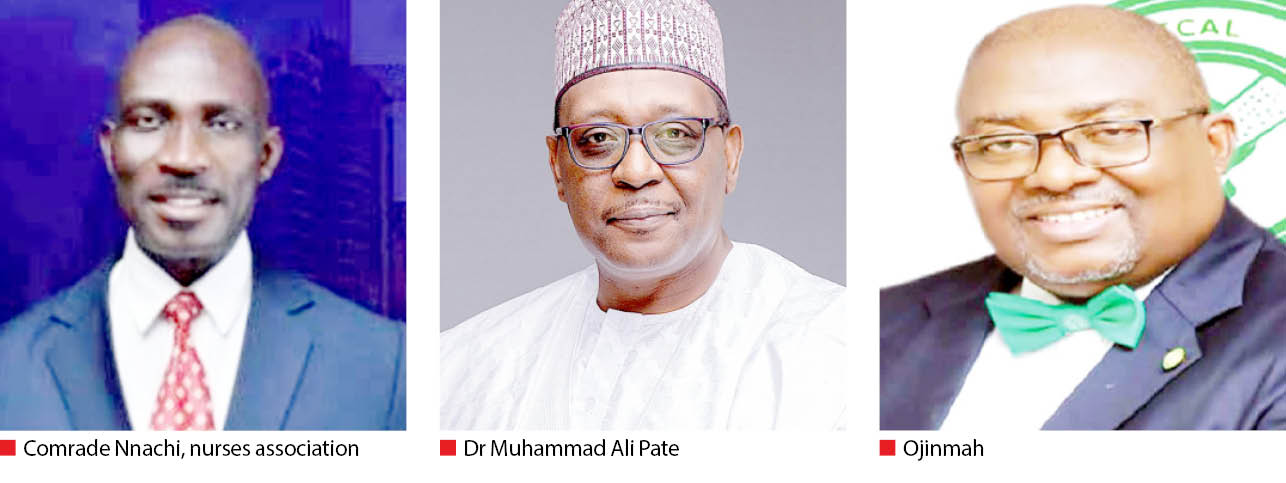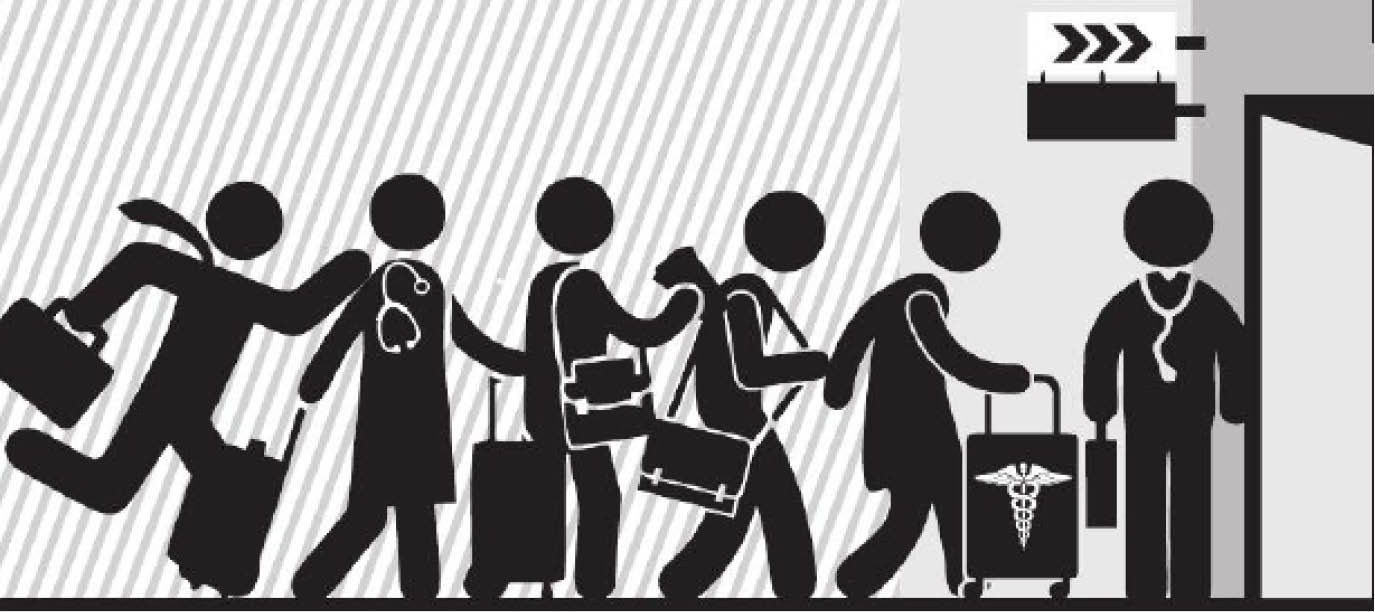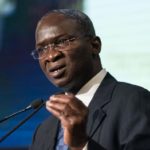The exodus of healthcare professionals out of the country for greener pastures is taking a toll on service delivery in many teaching hospitals as critical departments in various facilities are left with fewer experienced hands.
Daily Trust Saturday reports that a lot of medical doctors, nurses and midwives, pharmacists, medical laboratory scientists, physiotherapists, radiographers and other healthcare workers have migrated out of the country, thereby causing a dearth in the needed manpower at the facilities.
This further causes too much workload for the remaining staff, along with attendant burnout, delays in accessing health care for patients or poor quality, or no care at all for some.
Investigations revealed that some teaching hospitals, for instance, can no longer boast of a single medical doctor in specialities like nephrology, dermatology, cardiology, gynaecology, urology and dentistry, among others, to enable patients access care for kidney diseases and dialysis, skin care, heart diseases, female and male reproductive health and oral health.
- Mohbad: Court holds preliminary sitting, adjourns till Oct 13 for hearing
- Japa: Navy arrests stowaways hiding inside foreign ship in Lagos
This has further led to a situation where certain key departments at teaching hospitals have been closed down completely or offer skeletal services.
As a result, some patients referred from secondary and primary levels of care and other states have to wait for months to access surgeries or procedures at teaching hospitals because of the non availability of requisite specialists.
Findings revealed that some patients and their families resort to private health facilities during the long wait, while others are getting worse and dying with their ailments.

Rate of brain drain of nurses, doctors, others
The Nigeria Medical Association (NMA) said Nigeria had only about 24, 000 actively licensed physicians caring for its over 200million population as a result of brain drain in the country.
The president of the association, Dr Ojinmah Uche, said this gave a ratio of approximately 1 doctor to 10,000 patients. He said this was a national average, as in most states, the situation is palpably worse.
He said, “Only one doctor is incredibly available to treat 30,000 patients in some states in the South, while states in the North are as worse as one doctor to 45,000 patients. In some rural areas, patients have to travel more than 30 kilometers from their abodes to get medical attention where available, thus Nigeria making access to health care a rarity.”
Nigeria is also estimated to have the third highest number of foreign medical doctors working in the United Kingdom, after India and Pakistan.
The number of Nigerian-trained nurses who left Nigeria for the UK was the third-highest in the world and highest in Africa, according to a study by the development Research and Projects Centre (dRPC).
The Medical and Dental Consultants’ Association of Nigeria (MDCAN) said its 2022 survey revealed that over 500 consultants were estimated to have left Nigeria over the preceding two years.
“Fresh doctors work under supervision of the more senior ones. Without addressing the retention of the more senior doctors, coercion of the fresh doctors to stay in the system will be a futile effort,” Victor Makanjuola, president of MDCAN said.
The National Association of Nigeria Nurses and Midwives (NANNM) said over 75,000 nurses and midwives had migrated from Nigeria within a period of five years.
The national president of the association, Comrade Micheal Ekuma, said there was the need to “provide adequate resources and support for nurses in the workplace and address the root causes of nursing shortages.”
Also, data from the register of the Nursing and Midwifery Council (NMC) of the UK shows that the number of Nigeria-trained nurses increased by 68.4 per cent from 2,790 in March 2017 to 7,256 in March 2022.
The Director of Physiotherapy Services, Lagos State Health Service Commission, Dr Ayobami Oni, said there was a reduction of physiotherapists in hospitals in Lagos State due to the japa syndrome. “We had over 100 physiotherapists in the past, but in recent times, the number fluctuates between 70 and 80,” he said.
Impact of ‘Japa syndrome’ at University of Port Harcourt Teaching Hospital
The ‘Japa syndrome’ is affecting operations at the University of Port Harcourt Teaching Hospital, findings by our correspondent revealed.
A source at the hospital told our correspondent that many of the doctors that left for overseas were using proxy to retain their jobs.
He said the development most times affected service delivery, especially in clinical services, a situation he said put much demand on the other medical personnel.
“Japa syndrome is really affecting medical delivery in the hospital. They travel overseas but you find out that they are using proxy to retain their service on the pay role,” he said.
Another staff of the hospital who pleaded anonymity said, “Japa is affecting service delivery, especially in specialised departments. Doctors are leaving on a daily basis because of poor working conditions. If you go to some departments you will see crowd of patients waiting to see few medical personnel that are working in the hospital.
“Many doctors have left the hospital for either greener pastures abroad or medical training. This development has lead to shortage of personnel in the hospital,” the source added.
But the public relations officer of the hospital, Victory Nemi, said doctors who left were going for further training, adding that the exit of medical personnel did not in any way affect its services.
Efforts to speak with the chairman of Resident Doctors Association in the UPTH was unsuccessful, but the state chairman of the NMA, Dr Ebbi Robbinson, said that doctors in the state were leaving in droves.
He said it’s not only doctors that are leaving the country in search of greener pastures but also other health workers. He said their exit was affecting health delivery services in the state.
‘Yobe hospitals need gynecologists, pediatricians, surgeons, internal medicine doctors’
Yobe is one of the states recuperating from the effects of Boko Haram insurgency, which created setback to many sectors, including health; therefore, the problem has created more harm to the post-insurgency recovery process in the health sector.
Daily Trust Saturday gathered that the Federal Medical Centre, Nguru is one of the biggest health centres in northeastern Nigeria. Available doctors are overwhelmed while patients have to spend long hours to be attended to due to inadequate personnel.
Fatima Bukar, a mother who brought her children to the hospital, told our correspondent that she spent more than one hour to see a doctor.
‘‘The best thing is to go to a private hospital if you have the money. I have been here for more than one hour,’’ she said.
The situation is not different at the Yobe State Teaching Hospital in Damaturu. Our correspondent observed that the nurses were doing all they could, including rendering skeletal services and attending to minor health issues.
At the Accident and Emergency Ward, some persons waited for hours in the hope of seeing a doctor, our correspondent who visited the department in the hospital observed.
One of the relatives of a patient in the unit told our correspondent that ‘‘my brother was shot by our people (Fulani) with bows and arrows as a result of misunderstanding. We brought him here since morning but no one is attending to him.
‘‘We complained and they said the doctor was coming, but till now we haven’t seen any doctor and our brother is in pain,’’ he complained.
A staff in the administrative department of the Yobe State Teaching Hospital who spoke on the condition of anonymity said the Japa syndrome had created inadequate personnel to handle some departments in the hospital.
‘‘Some medical doctors have fled the country to further their studies while some were terrified by the security situation in the state.
‘‘Recently, the hospital made an advisement for employment into the clinical services of consultant pediatricians/obstetrics and gynecology, as well as medical officers, nursing and midwives,’’ he said.
When contacted, Dr Abubakar Kaumi, the state chairman of the NMA said several medical doctors fled the state to developed countries as a result of insecurity and low earnings.
‘‘Some have gone to further their education while some were afraid of the security situation. As you know, Borno and Yobe are the epicenter of insurgency.
‘‘Also, some medical doctors made it public that what they were receiving (salaries and allowances and social amenities) was not enough to care for their needs; that’s why they fled the country.
‘‘Equipment and condition of service are another challenge. We have a lot of patients. We can handle their treatment but we don’t have the equipment to do the operations. That is why some of us decided to flee so that they don’t lose their skills.
‘‘Most of our members (northern medical doctors) who fled the country prefer Arab countries like Saudi Arabia, Qatar, Dubai or Doha because they are paying better than western countries.
‘‘In Yobe, we seriously need gynecologists, pediatricians, surgeons and internal medicine doctors. We seriously need them to fill the gap,’’ he said.
Delays bedeviling patients care at UITH
At the University of Ilọrin Teaching Hospital (UITH), patients who spoke with Daily Trust Saturday lamented the delay in waiting for doctors to come and attend to patients.
At the Ilọrin General Hospital, it was observed that patients sometimes stayed for hours to open a card for treatment because of the shortage of staff at the registry.
Narrating her experience at the UITH, Mrs Abdullahi Maryam, whose cousin’s arm was amputated, said, “We rushed him to the hospital after a terrible accident from which he lost lots of blood. At the emergence section, there was only one doctor in the whole of the place that night and there were other serious emergency cases. At the end of the day, one of them who had internal fracture died. If not that God had not decreed my cousin’s death, nothing would have saved him,” she added.
The Kwara State chairman of the NMA, Dr Ola Ahmed, said the Japa syndrome was a big issue and had really affected health and other sectors.
He said, “We have lost a lot of our specialists and other medical staff. In Kwara alone, we have lost close to 200 doctors to Japa, and many are still leaving.
“Before now, in the whole of Kwara, we had over 750 doctors, but now, it’s just about 600. At that time they were still not enough to cater for the over 3.5million population of Kwarans. So we were having a doctor to patient ratio of 1:5000. Now the number of doctors is less with highest population figures.
“The workload on the existing ones has increased tremendously, which means that the quality of care will drop,” he noted.
Dr Ahmed said many of the units that needs specialist were understaffed.
He said, “Cases that ordinarily need to be managed will have to be referred to where there are also inadequate doctors. Sickness that is supposed to be taken care of within two to three weeks now lasts about six months, with attendant effects on patients.
“People spend a whole day in the hospital for minor treatments, which is a serious drain on manpower. There is no department that is not affected.
However, the Kwara State Government has really improved on the pay of doctors and we are now almost at par with federal workers. The governor has equally given approval for the recruitment of more doctors. But we are still not getting there because even some of those on ground are still planning to leave.”
He called for a holistic solution to the Japa syndrome through massive improvement in security, infrastructure, doctors’ education and welfare, among others.
“Doctors who go on night calls are now afraid, especially those in rural areas. Generally, infrastructure at the hospital is bad. When you are trained and know what to do but you don’t have the infrastructure to be able to carry out necessary treatment, it is something else,” he added.
Shortage of specialists, young doctors bedeviling facilities in Benue
In Benue State, the continued flight of doctors to seek greener pastures in foreign countries has in no small measures impacted negatively on health facilities.
Our correspondent reports that the situation has created inadequacy of personnel to handle some departments in most government hospitals. For instance, the Benue State University Teaching Hospital (BSUTH) lacks adequate manpower to hold sway in several departments, such as pediatric, dermatitis and infectious disease centre, amongst others.
Some patients who preferred anonymity told our correspondent that they could hardly access a consultant in their critical area of health need.
A patient said she needed serious attention for a consistent brain ailment and had to be referred to a tertiary hospital outside the state, basically due to lack of specialists to handle such situation in the state-owned facility.
The head of the psychiatric unit of the Federal Medical Centre (FMC), Dr Isaiah Obekpa, thinks the impact of an understaffed organisation is overwhelming.
Obekpa said, “It is simple. When the job meant for 10 workers is handled by three, you don’t need to be an expert evaluator in workplace efficiency and productivity to know that the productivity of the three workers is nothing compared to what 10 workers will do. As a country, we probably think this problem will one day automatically solve itself
“Asking of how critical departments are doing in hospitals across the country, I will say that anyone should pray and fast not to be ill to the level that such individual will require critical care.”
Also, the state chairman of the NMA, Dr Ushakuma Anenga, said the Japa syndrome was plaguing hospitals in the country.
“We were made to understand that in the early 1990s and late 1980s, specialists were leaving the country for greener pastures. Now, we have everybody leaving, not just specialists. Younger doctors are leaving. We have specialists leaving, so it is affecting training from all ramifications.
“We have inadequate younger doctors coming into the training. Residency training has been distorted because we don’t have even younger doctors wanting to be part of the residency training again as they prefer to go out there for the so-called greener pastures. We also have lack of specialists to train the younger doctors. For instance, at the BSUTH, there is no endocrinologist, dermatologist, infectious disease specialist, pediatric surgeon or neurosurgeon. So, for most of these specialist training, the resident doctors here have to go to other centres where specialists are located to train them. When training is going on, patients that have such conditions too are seen as part of residency, so you see that even the care of such patients is affected, then the training itself,” he added.
Anenga also said poor remuneration was a very strong factor fueling the Japa syndrome.
Suggesting a way out, the NMA said, “If government can increase funding for the health sector, such that we have doctors or other health workers having good pay, as well as increase funding that can lead to more infrastructure and equipment for doctors to work with, we can tackle this problem.
“Nobody leaves their country for nothing, something must be pushing them; and most times, it is the pay. If they can increase pay and funding for our decaying health institutions, it would go a long way.
“For instance, there is a recommendation that for health care to be driven in the right direction, every African country must dedicate at least 15 per cent of their budget to health funding, but in Nigeria, they are not living up to the expectation. Sometimes, it is four or five per cent, three times short of the required benchmark, so we will have three times short of whatever outcomes that is supposed to be optimal, meaning it is inadequate. So, we need to improve at the state and federal levels.”
Meanwhile, Governor Hyacinth Alia, few days ago approved the return of bonding scheme for doctors in the state in order to serve as an encouragement for them to stay in the state’s health facilities.
The bonding agreement is between medical students of the College of Health Sciences in the Benue State University (BSU) and the state government.
Alia had enacted the agreement during the 9th Professional Induction and Admission Ceremony for 2023 Graduating Doctors of the BSU College of Health Sciences in Makurdi.
By the bonding arrangement, the state government will place all medical students of the institution on a monthly allowances of 103,000 till graduation, but on the condition that they must compulsorily serve the state for not less than two years before taking a decision on whether to stay or leave for other engagements.
The bonding agreement was first introduced by the Senator Gabriel Suswam administration but later scraped during former Governor Samuel Ortom’s government, a development alleged to have made graduates of the school to continuously leave the state in search of greener pastures.
The governor said, “Medical doctors of Benue extraction who left the state and shores of the country in search of greener pastures should know that I, Rev. Fr. Hyacinth Alia is here now and is going to make the pasture greener in Benue. They are welcome back.”
He further called on all professional health workers of Benue origin to come home and contribute to the growth of the health institutions, insisting that the precarious state of the health sector in the state was the reason the state government under his watch decided to place all medical doctors on National Youth Service Corps (NYSC) in state on a monthly allowance of N100,000.00 to serve as an incentive for them to stay back after the orientation course to serve the state.
Alia added that it was due to the poor state of the health sector that, upon resumption of office, his administration also took the bold step of paying the 2023 medical residency allowance to all deserving resident doctors at the BSUTH to facilitate the training of resident doctors without interruption.
Meanwhile, brain drain is one of the reasons the Nigerian Association of Resident Doctors(NARD) has been embarking on strikes over the years. Its president, Dr Emeka Innocent Orji, said the association had enjoined the federal government to expedite action on the ‘one-for-one policy’ on the replacement of exited doctors and clinical staff to reduce the manpower shortage as a result of brain drain in the country.
The president of the NMA, Dr Ojinmah Uche, said there was the need for the government to address all the problems fueling brain drain in the country, such as poor renumeration, insecurity, unemployment, poor health facilities and equipment, poor working conditions and hostile working environment, among others.
The National Association of Government General Medical and Dental Practitioners (NAGGMDP) emphasized the need for the federal government to adopt homegrown solutions to brain drain. It said over 2,000 doctors had left Nigeria for Europe, Saudi Arabia and Canada as at June last year.
The chairman of the Committee of Chief Medical Directors of Federal Tertiary Hospitals, Professor Emem Bassey, said the health sector was undergoing a major crisis in terms of manpower.
Speaking during an appearance before the House of Representatives ad hoc committee, Bassey, who is the Chief Medical Director of the University of Uyo Teaching Hospital, said, “Replacement of these health workers is a major problem. This is because even though we are usually granted approvals to recruit, getting the waivers is a tortuous process.”
The new coordinating Minister of Health and Social Welfare, Prof Muhammad Ali Pate, while unveiling his four-point agenda for health earlier this month, acknowledged the manpower shortage in the health sector and promised to address the Japa syndrome.
He said the country’s 400,000 workforce, comprising community health workers, nurses, midwives, pharmacists, physicians, lab scientists, technicians and auxiliaries were not enough as they cannot take care of 220million people. “Our doctor to population ratio is lower than what the World Health Organisation expects,” he said.
He added, “There is still room to produce more; in fact, to produce excess because globally, there’s a shortage of health manpower, there is almost a shortage of 18million people.
“So, if we think about it, we can produce for our own needs, and if some leave, they go and earn resources and come back with some experience. I don’t want to undervalue the contribution of workers.”
Lagos suffers shortage of physiotherapists
The Director of Physiotherapy Services, Lagos State Health Service Commission, Dr Ayobami Oni, has revealed that there is a reduction of physiotherapists in hospitals in the state due to the Japa syndrome.
Oni, who disclosed this during an interview with newsmen at the public lecture of the 2023 Health Service Commission Physiotherapy Week titled, Anthiriss, explained that out of the state’s 28 secondary health facilities, 17 had the physiotherapy department.
“We have about 28 secondary health facilities but physiotherapy departments are present in 17 and we are still expanding.
“Ordinarily, what limited us was the Japa syndrome. We had over 100 physiotherapists in the past, but in recent times, the number fluctuates between 70 and 80,” he said.
He, however, said the state government had been working to reduce the numerical gap of physiotherapists in the state.
“Sincerely, I must give it to the Lagos State Government because over the last four to five years, they have consistently recruited new physiotherapists on the average of 20 each year, but because of the Japa syndrome this keeps reducing.
“But the state government is still recruiting and replacing those that have left and making room for expansion,” he added.
Earlier, the wife of the Lagos State governor, Dr Ibijoke Sanwo-Olu, stressed that the state government’s vision to attain universal health coverage may not be fully accomplished if the physiotherapy profession was left behind.
Mrs Sanwo-Olu, who was represented by the managing director/chief executive officer of the Harvey Road Health Centre and Maternity, Mrs Folashade Fadare, urged the physiotherapists in the state to discharge their duties professionally.
The registrar/chief executive officer of the Medical Rehabilitation Therapist Board of Nigeria (MRTBN), Prof Rufai Yusuf Ahmad, who was the guest speaker, stressed the importance of revoking licences of practitioners who failed to comply with regulations.
Ojoma Akor (Abuja), Victor Edozie (Port Harcourt), Hope Abah Emmanuel (Makurdi), Habibu Idris Gimba (Damaturu), Mumini Abdulkareem (Ilorin) & Dotun Oluwashakin (Lagos)

 Join Daily Trust WhatsApp Community For Quick Access To News and Happenings Around You.
Join Daily Trust WhatsApp Community For Quick Access To News and Happenings Around You.


